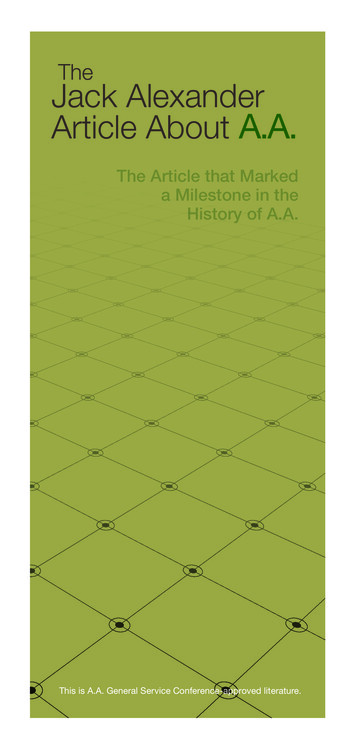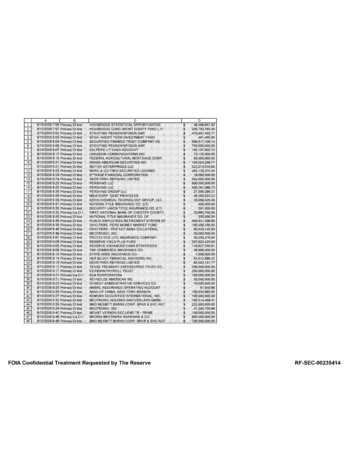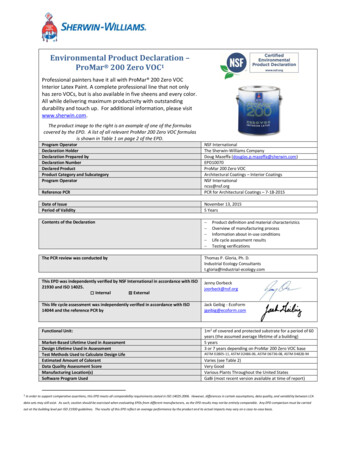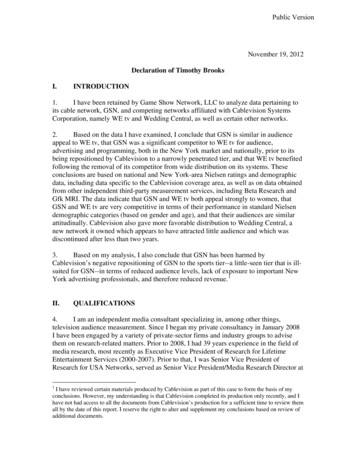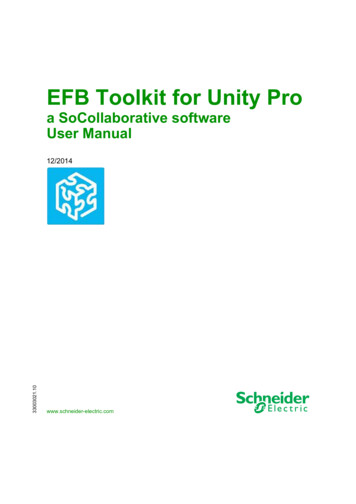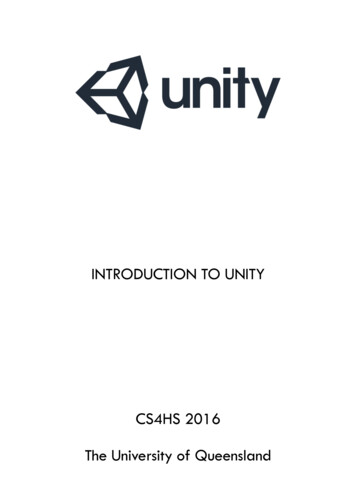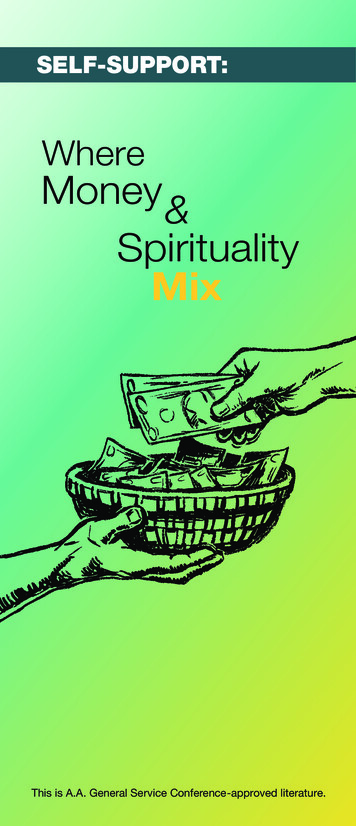
Transcription
SELF-SUPPORT:WhereMoney &SpiritualityMixThis is A.A. General Service Conference-approved literature.
A LCOHOLICS A NONYMOUS is a fellowship of menand women who share their experience, strengthand hope with each other that they may solvetheir common problem and help others to recoverfrom alcoholism. The only requirement for membership is adesire to stop drinking. There are no dues orfees for A.A. membership; we are self-supportingthrough our own contributions. A.A. is not allied with any sect, denomination,politics, organization or institution; does not wishto engage in any controversy; neither endorsesnor opposes any causes. Our primary purpose is to stay sober and helpother alcoholics to achieve sobriety.Copyright by AA Grapevine, Inc.;reprinted with permission.Copyright 2018by Alcoholics Anonymous World Services, Inc.Updated June 2019.All rights reserved.Mail address: Box 459, Grand Central StationNew York, NY 10163www.aa.org54M – 9/19 (Ripon)Printed in U.S.A.
Self-Support:Where Money andSpirituality MixThe A.A. groups themselves ought to be fully supported by the voluntary contributions of their ownmembers.We think that each group should soon achieve thisideal; that any public solicitation of funds using thename of Alcoholics Anonymous is highly dangerous,whether by groups, clubs, hospitals, or other outsideagencies; that acceptance of large gifts from anysource, or of contributions carrying any obligationwhatever, is unwise.Then, too, we view with much concern those A.A.treasuries which continue, beyond prudent reserves,to accumulate funds for no stated A.A. purpose.Experience has often warned us that nothing can sosurely destroy our spiritual heritage as futile disputesover property, money, and authority.— Tradition Seven (long form)
Self-Support:Where Money andSpirituality Mix“The first time I had to talk about finances at adistrict meeting when I was my area’s treasurer, afellow in the back of the room yelled out: ‘Why inthe world are you always talking about money whenthis is a spiritual program?’ The guy threw me and Ididn’t know how to answer him.”From its earliest beginnings, A.A. has always incurred expenses — whether it be the cost of apot of coffee or the price of a place to meet. In theearly days, these costs were often absorbed by individual A.A.s or nonalcoholic friends who offeredtheir parlors and living rooms for A.A.s to meet in.However, as A.A. outgrew the generosity of theseearly friends and members, the Fellowship’s needfor income became more and more apparent.Bill W., A.A.’s co-founder, and some of the earlyA.A. members initially felt the only way for theFellowship to survive was to solicit financial support from philanthropic institutions or individualsoutside A.A. These “high rollers” could then supply the funds the Fellowship would need to carryout the vital Twelfth Step work the early A.A.s envisioned — to bankroll the army of paid missionaries, the chain of A.A. hospitals, and the library ofbooks they were certain to write.One potential A.A. patron, however, when approached by the pioneering members for money,instead helped to lay the groundwork for A.A.’sTradition of self-support: “I am afraid that moneywill spoil this thing,” said John D. Rockefeller Jr.,while at the same time endorsing the work of thefledgling Fellowship.This marked a turning point in A.A. history,and, as the reality of Mr. Rockefeller’s statement4
sank in and A.A. members began to see the truth inthe old cliche, “Who pays the piper calls the tune,”the seed of the Seventh Tradition took root.“We cannot skimp”With the realization that A.A. must steer clear ofoutside contributions in order to maintain its autonomy and independence came the understanding that the money necessary for A.A.’s survivalwould have to come from individual A.A. membersand groups. As Bill W. put it in 1957, “Our spiritual way of life is safe for future generations if, as aSociety, we resist the temptation to receive moneyfrom the outside world. But this leaves us with aresponsibility — one that every member ought tounderstand. We cannot skimp when the treasurerof our group passes the hat. Our groups, our areas,and A.A. as a whole will not function unless ourservices are sufficient and their bills are paid.“When we meet and defeat the temptationto take large gifts, we are only being prudent.But when we are generous with the hat we givea token that we are grateful for our blessingsand evidence that we are eager to share whatwe have found with all those who still suffer.” (TheLanguage of the Heart, p. 221)Where Money andSpirituality Mix“Self-support begins with me, because I am part ofus — the group. We pay our rent and utility bills, buycoffee, snacks and A.A. literature. We support ourcentral office, our area committee, and our GeneralService Office. If it were not for those entities, manynew people would never discover the miraclesof A.A.”Twelfth Step work is the lifeblood of AlcoholicsAnonymous — carrying the message to the nextsuffering alcoholic. Without it, the Fellowshipwould wither and die. Yet, even at its simplestlevel this vital contact between one alcoholic andanother involves an investment of time and money.5
“Let’s begin with my own sponsor, Ebby,” writesBill W., in the book Alcoholics Anonymous Comes ofAge. “When Ebby heard how serious my drinkingwas, he resolved to visit me. He was in New York;I was in Brooklyn. His resolve was not enough; hehad to take action and he had to spend money.“He called me on the phone and thengot into the subway; total cost, ten cents. At thelevel of the telephone booth and subway turnstile,spirituality and money began to mix. One withoutthe other would have amounted to nothing at all.“Right then and there, Ebby established theprinciple that A.A. in action calls for the sacrificeof much time and a little money.”Footing the bill“Now, where do A.A.’s services — worldwide,area, local — fit into our scheme of things?” askedBill W. in an October 1967 article in the A.A.Grapevine. “Why should we provide these functions with money?”According to Bill, “The answer is simpleenough. Every single A.A. service is designedto make more and better Twelfth Step work possible, whether it be a group meeting place, a central or intergroup office . . . or the world serviceHeadquarters . . . .“Though not costly, these service agencies areabsolutely essential to our continued expansion —to our survival as a Fellowship. Their costs are acollective obligation that rests squarely upon all6
of us. Our support of services actually amountsto a recognition on our part that A.A. must everywhere function in full strength — and that, underour Tradition of self-support, we are all going tofoot the bill.”How can groups participate?To help support A.A.’s essential services, theGeneral Service Conference suggests that individual groups, through an informed group conscience, adopt a specific contribution plan tailoredto meet the group’s financial situation.Once the basic group expenses have beentaken care of (for example, rent, refreshments,A.A. literature, Grapevine literature, local meetinglists, G.S.R. travel expenses to attend service functions) and a “prudent reserve” has been set asideto cover any emergency contingencies that mightarise, the group may decide to further carry themessage by sending money to the following A.A.service entities: The local district, which communicates di-rectly with the groups, providing the district groupconscience for the area assemblies, and serving asa link between the area delegates and the G.S.R.s. The area committee, which coordinates vi-tal A.A. activities over a broad geographic area;sends a delegate to the annual General ServiceConference; holds area assemblies to determinethe needs of the Fellowship; and provides information at all levels of service. The local intergroup or central office, whichmay provide phone service for Twelfth Step callsand other inquiries; coordinates group activities;and facilitates A.A. literature sales, institutionswork, public information, and cooperation with theprofessional community activities. A.A.’s General Ser vice Office, which func-tions as a storehouse of A.A. information, communicating with members and groups around theworld; publishes A.A.’s literature; and suppliesinformation and experience to professionals andothers interested in A.A.7
Whose Job Is It?“The paradox of A.A. is that financial independenceand the support of our Fellowship by alcoholics andalcoholics alone not only enhances A.A.’s importance to each of us, but stimulates our engagementin our own recovery A.A. is ‘our thing,’ from ourgroup’s treasury to the balance sheets at the GeneralService Office.”Money has never been a requirement for A.A.membership, and to keep it that way all of A.A.’strusted servants have an ongoing obligation toinform groups and individuals about the value ofself-support and the need for voluntary contributions throughout the Fellowship.Many groups in reaching an informed groupconscience look to their general service representatives (G.S.R.s) for specific information aboutA.A. finances, or to their intergroup representatives or group treasurer. Many find that participation in local, area and regional A.A. service eventsprovides a good source of information aboutA.A.’s financial needs. And at the General ServiceOffice, A.A.’s financial affairs are an open book,with financial summaries published quarterly anda full accounting printed each year in the FinalConference Report.The Bottom Line“Now that we are sober in A.A., the word ‘support’has to do with sharing, people, self-respect, gratitude,and what we are privileged to give — not take — inmaterial terms.”While the Fellowship has always faced problemsof money, property and prestige in one form or another, through the wisdom of the Seventh Traditionwe have never been diverted from our primary purpose of carrying the message to the alcoholic whostill suffers — wherever he or she may be. This isthe fundamental work of Alcoholics Anonymous,and to ensure that the hand of A.A. will alwaysremain outstretched, money and spirituality mustcontinue to mix. And for that, we are all responsible.8
Some Questions and AnswersAbout A.A.’s FinancesQ What is a “prudent reser ve”?A Any suggested prudent reserve for a groupshould be dependent on local needs. A suggestedprudent reserve for central offices, intergroups,and area committees could be one to 12 months’operating expenses, depending on local needs.Q Does the General Ser vice Office havea “prudent reser ve”?A In 1954 A.A.’s Board of Trustees establisheda reserve fund whose principal purpose is to provide the financial resources necessary to continuethe essential services of G.S.O. and the Grapevinefor up to a year in the event of an unexpected andsubstantial reduction in the normal revenues ofthe organization.Q Is there a limit on how much anindividual can contribute to G.S.O.?A Yes. That limit is 5,000 a year.Q Can people leave money to A.A.in their wills?A Bequests in wills are acceptable only from A.A.members on a one-time basis, and not in perpetuity. The limit is 10,000.Q Can a group have too much money?A As stated in the long form of Tradition Seven,“We view with much concern those A.A. treasuries which continue, beyond prudent reserves,to accumulate funds for no stated A.A. purpose.Experience has often warned us that nothing canso surely destroy our spiritual heritage as futiledisputes over property, money, and authority.”Q Who manages G.S.O.’s share ofyour group contributions?A The General Service Board’s Finance Committeemeets quarterly to review and approve G.S.O.’sbudget and the audited financial accounts.The A.A. World Services Board meets monthlyand maintains direct control of income and expenditures.9
The annual General Service Conference reviews A.A.’s finances through its own FinanceCommittee.A.A.’s financial affairs are an “open” book. Asummary is published in each Quarterly Reportand a full accounting is in the Final ConferenceReport. The account books themselves are available at the General Service Office for scrutiny atany time.Q Who manages the other portionsof your group contributions?A Intergroup or central office funds are generallyadministered by steering committees composed ofrepresentatives of the groups they serve.Areas and districts generally have volunteertreasurers who administer funds contributed bygroups.Q How can an individual membercontribute to G.S.O.?A On your A.A. birthday: Contribute 1.00 ormore for each year of sobriety — or as much asyou wish to give (up to 5,000). You may requestthat your group be credited.Q Can an individual or group makea recurring online contribution?A Yes, online at aa.org.Q Are there other kinds of contributions?A Special contributions: funds realized from conventions, conferences, dinners, area get-togethers, etc. (no limitations on these contributions).10
Q Do all groups contribute toA.A.’s ser vice entities?A No. Contributions are strictly voluntary andsome groups simply cannot afford additionalcontributions after covering their basic needs.Additionally, there are groups who, for whateverreasons, choose not to be a part of the selfsupport network. These groups, nevertheless, willreceive basic services from the district, area andintergroup if they wish, and are welcome to listwith G.S.O., where they will receive the same basicservices as other groups. In 2017 the percentageof all listed groups who contributed to G.S.O. was43.7%, in 2016 it was 41.5%.Q What do contributions to G.S.O. cover?A The 2017 service dollar was spent on the following activities: Group Services 35.6% (which includes various group contact-type costs in additionto Box 4-5-9; A.A. Directories; records and files;contributions processing; and French services);the General Service Conference, 12.1%; Loners,Internationalists, and Overseas Services, 8.8%;trustees’ and directors’ activities, 6.9%; RegionalF
We pay our rent and utility bills, buy coffee, snacks and A.A. literature. We support our central office, our area committee, and our General Service Office. If it were not for those entities, many new people would never discover the miracles of A.A.” Twelfth Step work is the lifeblood of Alcoholics Anonymous — carrying the message to the next suffering alcoholic. Without it, the .
